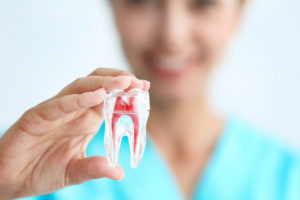Common Causes of Jaw Pain

- Physical assault to the face
- Sports injuries
- Motor vehicle accidents
- Slip and fall accidents
- Industrial or workplace accidents
Temporomandibular Joint Disorder (TMD)
TMD is a leading cause of jaw pain. The temporomandibular joints are located on either side of the back of the jaw. They function to move the lower mandible. Muscles, ligaments, and nerves within the jaw all work together to help with chewing and speaking. An improperly aligned bite, trauma, clenching, or grinding of the teeth are several factors which can lead to a TMJ disorder.
Several symptoms that might suggest a TMJ disorder include:
- Pain
- Jaw clicking or popping
- Stiffness in the jaw, or the jaw might lock up
- Swelling or tenderness around the temporomandibular joint area
- Ringing in the ears; ear pain which is not related to an infection
- Chronic headaches or migraines
- Tooth sensitivity or pain
- Neck, shoulder, and upper back discomfort
If structural issues are contributing to your jaw pain, you would likely benefit from a visit to an orthodontist to have your bite and jaw evaluated and treated. If you have any of these symptoms, make sure you are evaluated by an orthodontist right away.
Cluster headaches
Cluster headaches can not only lead to pain in the jaw but also in the head and behind or around the eyes.
Tooth pain
An abscessed tooth may lead to jaw discomfort and pain. An abscessed tooth likely comes from an infection, so you should contact and see a dental professional as soon as possible.
Sinus infection or sinusitis
Sinusitis leads to a significant amount of pressure under the eyes, which can also radiate down to your jaw.
Nerve irritation or damage
Jaw pain may arise from nerve pain. Compression of a nerve that runs through the face, called the trigeminal nerve, can lead to the condition trigeminal neuralgia. Pain in the face, upper, and lower jaw are possible with trigeminal neuralgia.
Treating Jaw Pain
Jaw pain can worsen with continued easting and speaking. You would be well-advised to have an orthodontic evaluation as soon as possible. If the underlying issue is due to a bite issue (where the upper and lower jaws don’t line up correctly), then orthodontic treatments like braces can help fix the poor alignment and reduce pain and other symptoms.
A poorly aligned bite can cause:
- Pain
- TMJ discomfort
- Speech difficulties
- Chewing problems
- Premature wear of the teeth and enamel
- Social anxiety
Without treatment, a poorly aligned bite can increase the chance of injury to the teeth and jaw.
Getting the Right Treatment and Compensation
If your jaw issues are the result of a trauma caused by another person’s fault or negligence, you might be eligible for compensation for the cost of orthodontic treatment through a personal injury claim. Make sure to discuss this with John Redmond Orthodontics who provide orthodontics in Orange County, CA so we can supply you with the required proof of your need for treatment.

Client Review
“So glad this John Redmond was recommended to us for our two teenagers braces. Super friendly staff, clean office, great prices, and great with military families. We’ve been coming here for almost two years and only good experiences! My kids love the extra touch of a homemade cookie as they leave.” Nagasiva Kumar